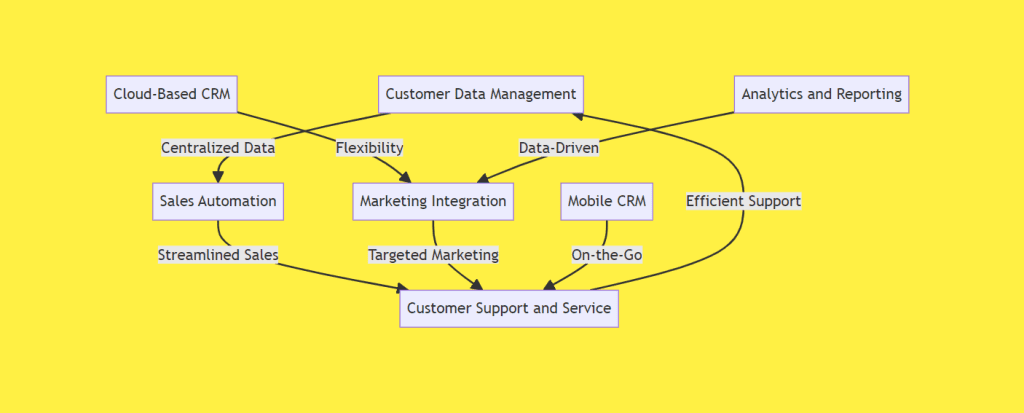In the realm of modern business operations, Customer Relationship Management (CRM) plays an integral role in achieving success. At its core, CRM serves as the lifeblood that nourishes your interactions with customers, fostering lasting relationships and driving growth. In this comprehensive guide, we delve into the intricate components of customer relationship management (CRM), dissecting its key elements and highlighting the strategies that can give you an upper hand in this competitive landscape.

CRM Defined: A Holistic Approach to Customer Engagement
CRM, in its essence, is a strategy that encompasses a variety of business processes, technologies, and tactics designed to enhance customer interactions. It’s more than just a piece of software; it’s a holistic approach to customer engagement. CRM is the conduit that connects your business with your customers, helping you understand, manage, and ultimately, serve their needs better.
Customer Data Management: The Backbone of components of customer relationship management
One of the cornerstones of an effective CRM strategy is customer data management. In today’s digital age, businesses are inundated with data from various touchpoints. CRM systems centralize this information, creating a comprehensive customer profile. This enables businesses to make data-driven decisions, personalize interactions, and offer tailored solutions to meet their customer’s unique needs.
Sales Automation: Streamlining Your Sales Process
Efficiency is paramount in the world of sales, and CRM can streamline your sales process through automation. Sales automation tools embedded within CRM software allow you to manage leads, track interactions, and monitor the progress of deals. With automation, your sales team can focus more on building relationships and less on administrative tasks.
Marketing Integration: Targeted Campaigns for Maximum Impact
Effective marketing is essential for business growth. components of customer relationship management systems can integrate with your marketing efforts, enabling targeted campaigns and personalized messaging. By segmenting your customer base and analyzing their behavior, you can tailor marketing strategies that resonate with specific groups, leading to higher conversion rates.
Customer Support and Service: Enhancing Customer Satisfaction
A successful CRM strategy includes a robust customer support component. CRM systems facilitate efficient case management, ensuring customer issues are addressed promptly. It allows you to provide timely solutions, enhancing customer satisfaction and loyalty.
The Technological Arsenal of CRM
CRM technology has evolved significantly in recent years. It now encompasses a broad array of tools and software, making it a versatile asset for businesses of all sizes.
Cloud-Based CRM: Flexibility and Accessibility
Cloud-based CRM solutions have gained prominence due to their flexibility and accessibility. They offer the advantage of remote access, allowing your team to stay connected and productive from anywhere. With data stored in the cloud, you can ensure data security and scalability.
Mobile CRM: On-the-Go Connectivity
In a world where mobile devices dominate, Mobile CRM apps empower your team to stay connected and productive while on the move. Whether it’s a salesperson in the field or a support agent on call, mobile CRM keeps your team engaged and responsive.
Analytics and Reporting: Data-Driven Decision Making
The power of CRM lies in its ability to generate insights from data. Analytics and reporting tools in CRM allow you to monitor your sales, marketing, and customer service efforts. These insights help in evaluating the effectiveness of your strategies and making informed decisions.
Diagram: CRM Ecosystem

Crafting Your CRM Strategy
To outperform your competitors in the digital landscape, it’s not enough to simply have a CRM system in place. Crafting successful components of customer relationship management strategy requires a well-thought-out approach.
- Define Your Goals: Begin by setting clear, measurable objectives for your CRM strategy. Whether it’s increasing sales, improving customer satisfaction, or expanding your market reach, your goals will guide your CRM implementation.
- Choose the Right CRM Software: Select a CRM solution that aligns with your business needs. Ensure it provides the features and scalability required to support your goals.
- Data Quality and Integration: Ensure that the data fed into your CRM system is of high quality. Integrate CRM with other business systems to maintain consistency and accuracy.
- Training and Adoption: Train your team to use CRM effectively. User adoption is crucial for success, so invest in training and provide ongoing support.
- Continuous Improvement: Regularly review and adapt your CRM strategy. As the business landscape evolves, so should your CRM approach.
In conclusion, CRM is a powerful tool that can propel your business to new heights. By understanding the components of customer relationship management (CRM), embracing technology, and crafting a strategic approach, you can position yourself to outrank your competitors and lead the way in building lasting customer relationships.









